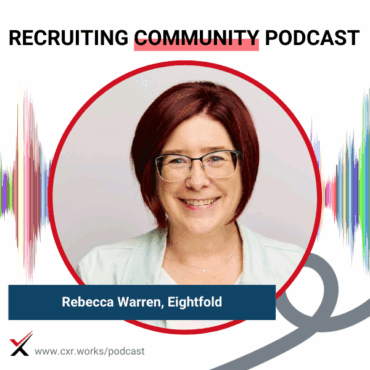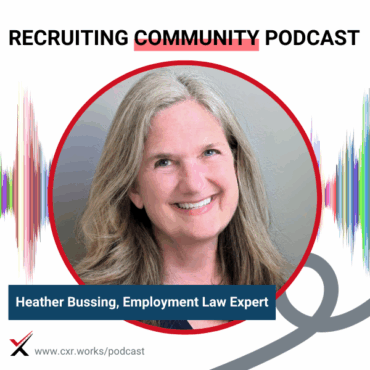
-
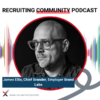 play_arrow
play_arrow
Talent Chooses You: Reframing the Role of TA in Driving Growth Cami Grace
-
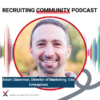 play_arrow
play_arrow
Inside the Cox Career Site Redesign: Data, AI & Candidate Experience Cami Grace
-
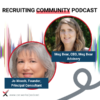 play_arrow
play_arrow
Vietnam TA/HR Delegation Recap Cami Grace
-
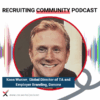 play_arrow
play_arrow
- Home
- keyboard_arrow_right Analytics
- keyboard_arrow_right Candidate Experience
- keyboard_arrow_rightPodcasts
- keyboard_arrow_rightUnleash 2025
- keyboard_arrow_right Hiring Without Bias: The Alooba Approach to Smarter Recruitment
Hiring Without Bias: The Alooba Approach to Smarter Recruitment
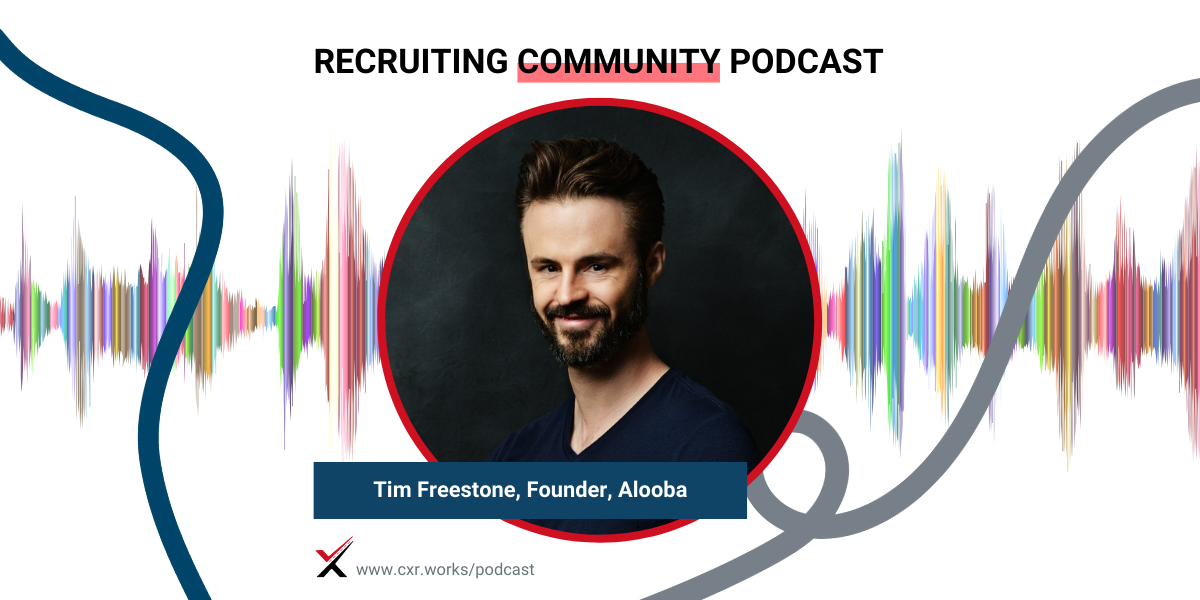
🎧 Show Notes
Featured Guests:
Tim Freestone, Founder of Aluba
Hosts:
Chris Hoyt, Host, CareerXroads
Gerry Crispin, Host, CareerXroads
Episode Overview:
In this episode, the CXR team speaks with Tim Freestone, founder of Aluba, about the evolution of skills-based hiring and the challenges of achieving true objectivity in recruitment. Tim shares insights from his company’s work in skills assessment and offers a grounded perspective on the importance of transparency, candidate feedback, and self-awareness in modern hiring practices.
Key Topics:
-
The origin and purpose of Aluba’s skills assessment platform
-
Shifting from degree-based to skills-based hiring models
-
Customization of assessments to reflect specific employer needs
-
Measuring self-awareness through pre-test self-ratings
-
Trends in how organizations define and prioritize job-related skills
-
Challenges in measuring learning agility and non-technical competencies
-
The impact of candidate transparency and feedback on hiring trust
-
Addressing human bias and exploring the role of AI in screening
-
Broader societal implications of fairness and inclusion in hiring practices
Notable Quotes:
“Objective hiring is about making sure the best person gets the job—however you define ‘best.’” — Tim Freestone
“Hiring is at a low point in terms of trust right now… Transparency and feedback are the way forward.” — Tim Freestone
“Most people aren’t very self-aware.” — Tim Freestone
“Even if no hiring process is ever perfectly objective, we should strive for it.” — Tim Freestone
Takeaways:
Tim Freestone underscores the practical benefits and ethical imperatives of objective, skills-based hiring. By focusing on verified capabilities and consistent feedback, organizations can enhance fairness, reduce bias, and build greater trust with candidates. Aluba’s approach provides a model for how tools and data can support these goals while staying flexible to real-world variations in hiring needs.
Want more conversations like this?
Subscribe to the CXR podcast and explore how top talent leaders are shaping the future of recruiting. Learn more about the CareerXroads community at cxr.works.
🗒️ View Transcript
Announcer: Welcome to the Recruiting Community Podcast, the go-to channel for talent acquisition leaders and practitioners. This show is brought to you by CXR, a trusted community of thousands connecting the best minds in the industry to explore topics like attracting, engaging, and retaining top talent. Hosted by Chris Hoyt and Jerry Crispin.
We are thrilled to have you join the conversation.
Chris Hoyt: This is the Recruiting Community Podcast. We’re awfully excited to be here today and talk to you about what’s going on in the space. We typically do this in the form of a conversation with talent acquisition leaders and practitioners—folks doing work we want to hear about and shine a light on.
You can see future episodes or catch up on past ones at cxr.works/podcast. We keep it pretty simple. But let’s jump in.
So, Tim, before we dive into the deep stuff, let’s talk a little about who you are. Who is Tim Freestone? You’ve got a great name—sounds like you should be a rock star! What’s going on?
Tim Freestone: Hi, I’m Tim. I’m based in Sydney. I can tell you I’m a football fanatic—or soccer, I guess, as we call it a bit in both Australia and the US. I’ve just taken up tennis for the first time in my life, and I was happy to hear the teacher say, “Oh, you’re a natural.” Not sure if she says that to everyone, but I’m looking forward to getting into it more.
I’ve always used my legs for sports—now I’m going to use my arms. I’m pumped. I love exercise in general and love spending time with my nephews. I’ve got eight of them. One day I’ll have a niece, and that’ll complete the picture.
Chris Hoyt: Wow. Okay, so I’ve got two questions, Tim. Eight nieces and nephews—do you have one sibling?
Tim Freestone: I’m the youngest of five. My mom was very busy in the ’80s.
Chris Hoyt: Okay, otherwise you’d have had a very, very busy sibling.
Tim Freestone: Yeah.
Chris Hoyt: I’ve played two rounds of tennis in the last month. I just started. We got some rackets and there’s a court right by the house. I actually really enjoyed it.
Tim Freestone: Yeah, it’s fun. I used to play cricket as a kid—which I guess is similar to baseball—but I was always more of a bowler than a batter. So I never thought I had great hand-eye coordination, but I could hit the ball! I was kind of surprised. I’m enjoying it—psyched to try something new.
Chris Hoyt: I think our record is 14 volleys back and forth without missing. Keep in mind, we’re not trying to knock it away from each other. It’s just easy, soft hits—piece of cake.
Gerry Crispin: Ping pong’s more my speed.
Chris Hoyt: Jerry, I was waiting for you to say pickleball.
Gerry Crispin: No, no. My sister loves pickleball, but I just can’t wrap my mind around it. It’s like a cross between ping pong and tennis.
Tim Freestone: And it’s different from Paddle, isn’t it? Paddle is something else again—that’s more the European one.
Chris Hoyt: I think that’s right. Well, Tim, Renaissance man of all things—you were also involved with the Founder Institute, right?
Tim Freestone: Yeah, not the founder though. That was Adeo Ressi, who was Elon Musk’s college roommate. But he’s a billionaire in his own right and founded multiple companies. The Founder Institute is like an incubator/accelerator—kind of like Y Combinator. I was lucky to be part of it with my first company about 10 years ago. Highly recommend it for budding entrepreneurs. It’s a great community.
Chris Hoyt: Gotcha. I love it. But you are the founder of Aluba?
Tim Freestone: That I am.
Chris Hoyt: Give us the elevator pitch—what is Aluba?
Tim Freestone: Aluba is a skills assessment platform used by companies, typically during hiring. If you’re looking to get a sense of a candidate’s skills and knowledge in a specific area, they use our product—either as an early screening tool, especially for high-volume roles, or to get a more accurate picture beyond what’s on the resume.
We started out focused on analytics, data science, and BI skills, and then broadened to marketing, engineering, product, and other tech areas.
Gerry Crispin: It’s amazing. You’re right where employers are—trying to pivot to skills-focused hiring and leave behind degrees or certifications that don’t really prove anything.
Tim Freestone: Exactly. Everyone who went to university knows that not all graduates have the same abilities or skills. Even if they got the same degree, there’s a big variability in performance. And what relevance does my degree from 15 years ago really have now? I’ve forgotten most of it.
Getting a more current and accurate picture of someone’s skills bypasses the need to rely on outdated signals.
Gerry Crispin: But there’s such variability in how vendors approach skills. How did you decide on your taxonomy?
Tim Freestone: Good question. We started by going into the analytics community and asking product analysts, data scientists, BI analysts, and data managers: “What do you actually do day to day? What skills matter most?”
Then we wrote questions to assess those skills. It was very much bottom-up. We built a bank of expert-written questions and expanded from there.
Clients then choose the skills relevant to their definition of the role. Because in data, one company’s “analyst” could be another’s “data scientist.” So we let them customize the test accordingly.
Chris Hoyt: Is that kind of the foundation for what we call “objective hiring”?
Tim Freestone: Objective hiring is about making sure the best person gets the job—however you define “best.” It could be skills, experience, even likability if that’s important to the role.
I wouldn’t have an issue if a company said, “30% of this job is based on likability,” as long as they try to measure that and are transparent about it. The key is having some rubric and making decisions based on defined criteria.
Chris Hoyt: So with Aluba, do you get insights into how employers are defining roles? For example, if Jerry and I are both hiring sales consultants, are we seeing different requirements?
Tim Freestone: Yes, we see that. We guide customers with templates—like a typical Sales Development Rep template—and then they tweak it. They can add their own custom questions too, especially ones tied to their specific tools or workflows.
Chris Hoyt: What’s the average employer size using Aluba?
Tim Freestone: Average would be enterprise. We’ve worked with companies from 10 people to 200,000.
Chris Hoyt: With that kind of volume, are you seeing trends in how employers are approaching hiring for skills or deviating from your templates?
Tim Freestone: Yes—and interestingly, the appetite for skills-based hiring has gone through cycles. At first, there was a big move toward it. But then, a few years ago, I saw some reversals. For example, the University of Queensland Technology removed the concept of merit-based hiring in favor of hiring specifically from protected classes.
Also, as tech evolves, some companies now care less about current skillsets and more about learning agility—who can pick things up quickly. That’s a hard thing to measure, though.
Chris Hoyt: Have you had any surprises from your data?
Tim Freestone: One interesting metric we track is self-awareness. Before a candidate starts a test, we ask them to rate themselves 1–10 in different skills. We then compare that to how they actually performed.
Most people aren’t very self-aware.
Chris Hoyt: I imagine some gender trends—men overrate themselves, women underrate?
Tim Freestone: That’s what we thought, but in our data, we didn’t find a significant gender difference in overestimation. People overrate themselves, period.
Gerry Crispin: What about age?
Tim Freestone: We’ve looked at that too, but I’d have to revisit the data for detailed conclusions. It’d be interesting to see if self-assessment accuracy improves with age or experience.
Chris Hoyt: And by profession? Are engineers more or less accurate in self-assessments than, say, salespeople?
Tim Freestone: That’s another great angle—especially now, with AI impacting software engineering. A seasoned coder might feel threatened and that could affect their self-perception.
Chris Hoyt: So, what do you do with the self-awareness score?
Tim Freestone: The test doesn’t change based on their rating. But after the test, candidates see a chart comparing self-assessment to actual performance. Employers see it too. It’s useful for interview discussions—especially if someone underestimates or overestimates themselves significantly.
Gerry Crispin: Do all candidates get their results?
Tim Freestone: By default, yes. We show their overall score, skill-by-skill breakdown, and recommend resources for improvement. Some clients turn this off, but most don’t. I think candidates deserve feedback after spending time on a test. It builds trust.
Gerry Crispin: If companies don’t start providing that feedback, someone’s going to legislate it. I’d rather see us self-regulate, but history shows that’s hard.
Tim Freestone: Agreed. Hiring is at a low point in terms of trust right now. Candidates feel ghosted. Employers feel flooded with AI-generated resumes. There’s distrust on both sides. Transparency and feedback are the way forward.
Gerry Crispin: And clarity around AI—how it’s used by both employers and candidates.
Tim Freestone: Absolutely. Let me share a study from Australia. Three years ago, the University of Sydney submitted thousands of job applications using different name combinations—Anglo first/last names, Anglo-Chinese combos, and fully Chinese names. The results? Candidates with Chinese names had only a 4% callback rate versus 12% for Anglo names—same resumes, different names.
That’s human bias. AI screening, if done right, could help reduce that.
Gerry Crispin: Or we let everyone who applies take the test and collect better, fairer data from there.
Tim Freestone: That’s what we did early on. Customers invited all applicants to take the test. They discovered candidates they would’ve otherwise overlooked.
Of course, not everyone will take a test. And not every company can handle that volume. But it’s a good way to level the playing field.
Chris Hoyt: I love it. Tim, before we wrap up—we ask all our guests: If you were going to write a book on this topic, what would the title be?
Tim Freestone: Objective Hiring. That’s the name of our podcast too. It’s what I’ve been thinking and talking about for years. It’s a good North Star—even if no hiring process is ever perfectly objective, we should strive for it.
Gerry Crispin: Sounds like a mission. Moving toward more clarity and objectivity—definitely a good thing.
Chris Hoyt: Who gets the first signed copy? Present company excluded.
Tim Freestone: My mother.
Chris Hoyt: Something’s in the air—last five guests all said “my mom.” Must’ve been Mother’s Day or something.
Tim Freestone: Yeah, she got flowers on Sunday. A book would be a nice follow-up.
Chris Hoyt: You’re a good man, Tim. Thanks so much for joining us. We know you’re busy, and we really appreciate you taking the time to talk about objective hiring trends. It’s great to get to know you.
Tim Freestone: My pleasure. Thank you both.
Chris Hoyt: We do these weekly—join us on LinkedIn, YouTube, all the platforms. Check us out at www.cxr.works/podcast.
Announcer: Thanks for listening to the Recruiting Community Podcast, where talent acquisition leaders connect, learn, and grow together. Be sure to visit cxr.works/podcast to explore past episodes, see what’s coming up next, and find out how you can join the conversation. Whether you’ve got insights to share or want to be a guest on the show, we’d love to hear from you. If you’re interested in learning more about becoming a member of the CXR community, visit us at www.cxr.works. We’ll catch you in the next episode.
Tagged as: skills-based hiring, AI bias, diversity, Inclusion, Talent Acquisition, Hiring.


